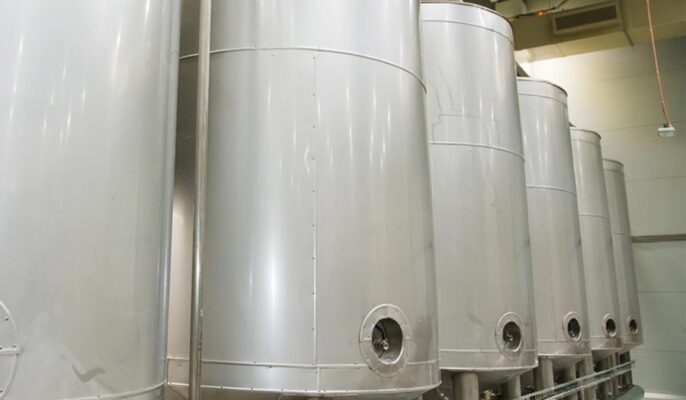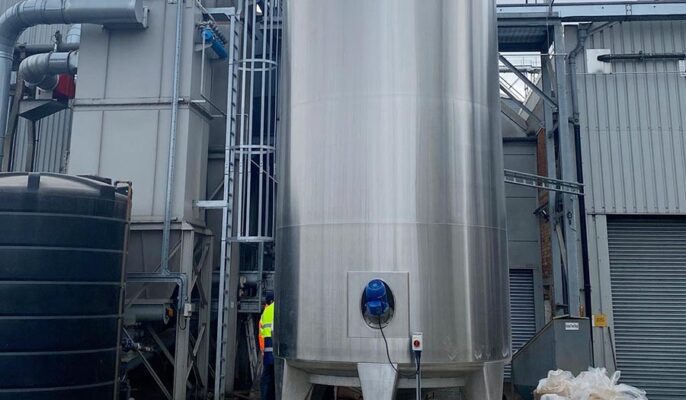In the food and beverage industry, the choice of storage tanks has a direct impact on product quality, safety, and production efficiency. In recent years, stainless steel storage tanks have become the equipment of choice in this industry due to their excellent performance and diverse benefits.SUS304/316 stainless steel storage tanks are widely used in the food and beverage industry for storing various liquids, including water, juices, dairy products, oils, and sauces. The stainless steel construction of the storage tanks ensures that the products are not contaminated and maintains their quality and freshness. Stainless steel storage tanks are also suitable for storing ingredients and raw materials in food and beverage production.
The role of stainless steel storage tanks in food and beverage production
Product quality assurance
Tanks aus rostfreiem Stahl are vital in maintaining the quality and freshness of food and beverage products throughout the production process. Stainless steel is inert and will not react with the food or beverage, thus ensuring that the flavor, aroma, and nutrient content of the product remain intact. Stainless steel storage tanks offer excellent corrosion resistance and sealing, features that ensure that stored food and beverages are not contaminated by the external environment. It prevents contamination and spoilage of perishable food products. Whether storing wine, brewing beer, or processing sauces and condiments, stainless steel tanks maintain the quality and integrity of the end product.
Hygiene and Food Safety
One of the main reasons why stainless steel tanks are favored in food and beverage production is their hygienic properties. Non-porous, corrosion-resistant, and easy to clean, stainless steel is ideal for food contact surfaces. Unlike other materials, stainless steel will not harbor bacteria, mold, or other contaminants, ensuring the integrity and safety of food and beverage products. Whether storing raw materials, fermenting beverages, or processing dairy products, stainless steel tanks provide a sterile environment that meets strict food safety standards.
Dauerhaftigkeit und Langlebigkeit
Another key benefit of stainless steel tanks is their durability and longevity, making them an affordable investment for food and beverage producers. Stainless steel is resistant to rust, corrosion, and abrasion, ensuring that tanks remain in optimal condition even in harsh operating environments. This durability reduces the need for frequent replacement or repair, saving producers time and money in the long run. In addition, stainless steel tanks are easy to maintain and sanitize, extending their service life and ensuring consistent performance.
Adapting to Diverse Needs
Stainless steel storage tanks are highly flexible and can be customized to meet production needs. For example, manufacturers can design different tank structures and capacities for different types of food or beverages to meet a variety of production requirements, resulting in a diverse and efficient production line.

Advantages of Stainless Steel Storage Tanks
Durability and Corrosion Resistance
One of the main advantages of stainless steel storage tanks is their excellent corrosion resistance. Since stainless steel contains chromium elements, these elements form a corrosion-resistant oxide film in the air, which effectively prevents corrosive substances such as acids, alkalis, and salts from eroding the tank.
This corrosion resistance makes stainless steel storage tanks in a variety of harsh environments and can be used to maintain their integrity and structural stability, thereby extending the service life of the tank.
High-temperature resistance
Stainless steel can withstand high-temperature environments without deformation or loss of strength. This makes it suitable for applications that require high-temperature storage or processing, such as hot water storage or material storage during heat treatment. Many stainless steel storage tanks are equipped with temperature control systems that can precisely control the temperature of the storage environment, ensuring that products are stored in the right conditions.
Einfach zu säubern
Stainless steel has a smooth surface and does not easily adhere to bacteria or impurities, making it easy to clean and sanitize. This characteristic is especially important for food and beverage, pharmaceutical, and other industries that require high hygiene standards. Due to its corrosion resistance and smooth surface, stainless steel is less likely to harbor microorganisms, helping to keep stored materials safe and hygienic.
Environmentally friendly
Stainless steel materials are recyclable, which meets environmental requirements. The use of stainless steel storage tanks helps to reduce resource waste and environmental pollution and enhance the green production image of enterprises. The durability and stability of stainless steel storage tanks reduce equipment failures and maintenance needs, thereby reducing energy and resource consumption.
Stainless steel storage tanks in food and beverage applications
Bierherstellung
Fermentation is a key process in beer production. Stainless steel storage tanks (often referred to as Fermenter) can be used to control fermentation temperatures and ensure that the beer yeast ferments in an optimal environment. The sealing and temperature control system of the fermenter prevents oxidation and contamination, maintaining the flavor and quality of the beer. After fermentation, the beer is further aged in maturation tanks. Stainless steel maturation tanks provide a stable storage environment, avoiding the woody flavors that can be associated with traditional wooden barrels, and allow for precise temperature and pressure control.
Wine Vinification
Similar to beer production, stainless steel storage tanks are used for the wine fermentation process. These tanks maintain a stable environment for the grape juice during fermentation, preventing oxidation and preserving the pure flavor of the wine. Stainless steel storage tanks are used for wine aging to control temperature and humidity and to reduce possible off-flavors in the wine, ensuring consistent quality and taste.
Dairy Processing
In dairy processing, milk, and other dairy products need to be stored under strict hygienic conditions. The smooth interior and excellent corrosion resistance of stainless steel storage tanks make them ideal for milk storage, preventing bacterial contamination and material deterioration. Stainless steel storage tanks are also often used for the fermentation process of yogurt. The temperature control function of the tank allows precise control of the fermentation temperature, ensuring the quality and taste of the yogurt.
Juice production
Stainless steel storage tanks are used for the storage and processing of fruit juices, which can prevent the oxidation of fruit juices in contact with air and avoid contamination at the same time. Good sealing performance and corrosion resistance help to maintain the freshness and nutritional value of the juice. During the juice concentration process, stainless steel storage tanks can withstand high temperatures and pressures to ensure the efficiency and stability of the concentration process.
Seasoning production
Many condiments (e.g. soy sauce, vinegar, seasonings, etc.) require long storage periods during the production process. Stainless steel storage tanks prevent condiments from reacting with air, maintaining their original flavor and quality. Some condiment production requires fermentation and maturation, and the temperature control and sealing features of stainless steel tanks can effectively support these process steps.
Beverage Production
Various types of beverages (e.g. soft drinks, functional beverages, sports drinks, etc.) need to be stored and handled in stainless steel storage tanks during the production process. The corrosion resistance and hygienic properties of these tanks guarantee the quality and safety of the beverages. Stainless steel storage tanks are used for mixing and dosing of beverages, enabling precise control of the amount of raw materials added and the mixing process, improving production efficiency and product consistency.

Stainless steel storage tank maintenance and maintenance
- Regular Cleaning: Stainless steel storage tanks should be cleaned regularly, especially after storing different types of materials. The use of appropriate cleaning agents and methods can remove residual substances and dirt and prevent contamination.
- Checking seals: Regularly check the sealing status of the tank to ensure that the seals are not worn or deteriorated. If leaks or poor seals are found, the seals should be replaced or repaired promptly.
- Anti-corrosion treatment: Despite the corrosion resistance of stainless steel, in some extreme environments, tank surfaces still need to be regularly inspected for signs of corrosion and treated with appropriate maintenance.
- monitoring equipment: for stainless steel storage tanks equipped with temperature control and automation systems, the relevant equipment needs to be checked and calibrated regularly to ensure its proper operation.
FAQ
Was ist ein Lagertank aus rostfreiem Stahl?
Stainless steel storage tanks are containers made of stainless steel material, which are specially used for storing and handling various food and beverage ingredients. It is usually corrosion-resistant, high temperature-resistant, high pressure-resistant, and easy to clean, and is an indispensable equipment in the food and beverage production process.
Stainless steel storage tanks for which food and beverage?
Stainless steel storage tanks are widely used for various foods and beverages.
- Fermentation and maturation of beer and wine
- storage and handling of milk, yogurt, and other dairy products
- Storage of juices, syrups, and flavorings
- Production and storage of soft drinks and functional beverages
- Storage of food ingredients such as cereals and sugar
How to choose the suitable storage tank capacity?
The selection of storage tank capacity should be based on the actual demand and production scale. Selection is based on the amount of food or beverages that need to be stored on a daily or monthly basis. Consider the various steps in the production process, such as fermentation, mixing, and storage. Consider the space conditions of the production workshop or warehouse and choose the appropriate tank size.
How to ensure the food safety of stainless steel storage tanks?
Regularly clean and disinfect the tank to maintain its hygienic state, and ensure the sealing performance of the tank to prevent contamination. Regularly test the quality of stored materials to ensure that there is no contamination or deterioration.




